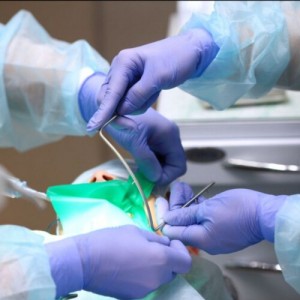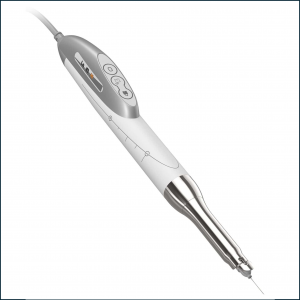
What to Know Before, and After, You Get Dental Implants
A generation ago, many people who lost teeth due to age-related complications typically wore dentures. Now, dental implants are a common alternative. In this process, a provider places a screw into the jaw, later fitted with a crown, to create a permanent replacement tooth. In the U.S., roughly 2.5 million people receive implants each year.
However, dental implants aren’t risk-free. Periodontitis—plaque accumulation, which causes gum inflammation and destruction of tissues and bone around the teeth—affects 743 million people worldwide. When this occurs alongside dental implants, it could cause the implant to loosen or fall out.
Natalie Jeong, chair of periodontology at Tufts University School of Dental Medicine, explains what prospective patients need to know about how to prepare for, and care for, implants.
Tufts Now: What are dental implants?
Jeong: Dental implants replace lost teeth. There are different elements, involving minor surgery: The implant itself is essentially a titanium or zirconia screw placed into your jawbone. It acts as a replacement root for the missing tooth.
Then, a special attachment called the abutment is fitted to the top of the implant. Finally, your dentist can actually make a crown on the implant, just like making a crown for teeth. The crown replaces the white part of the tooth, protruding from the gum.
Who’s a candidate for implants?
Pretty much everybody who’s missing a tooth or teeth are candidates for dental implants. Having said that, active periodontal disease is a risk factor for complications. People with uncontrolled diabetes, going through radiation to their head and neck, receiving active chemotherapy, or who are heavy smokers aren’t candidates.
People with periodontal disease tend to have dental-implant-related complications such as peri-implant diseases. People receiving radiation therapy to their head and neck can have bone density changes, which will cause dental implant failure. Heavy cigarette smoking can also affect healing.
What do people need to know about peri-implantitis?
People develop gum disease around the natural teeth, whether gingivitis or periodontitis, which is a more aggressive form of gum disease. In the same way, implants can develop conditions called peri-implant diseases. Peri-implant mucositis, or inflammation around soft tissue of the implant, is the first stage. If left untreated, mucositis can progress to a more dangerous condition called peri-implantitis. There’s greater inflammation, and we also see bone loss. Eventually, the implant could become mobile--loose and moveable--and we might lose it without treatment.
What are the signs and symptoms?
They can be very subtle, but peri-mucositis or peri-implantitis are very similar to symptoms of gum disease: red or tender gums around implants or bleeding when you’re brushing. If the area becomes infected, you’ll notice swelling, pus, or sometimes a bad taste in your mouth. Just think of it as gum disease around the implant.
Unfortunately, these diseases progress fast compared with gum disease around the natural teeth. We might have to remove the implant or, in severe cases, the implant will just fall out of your mouth. Typically, before the implant becomes really loose, you’ll notice tenderness and swelling.
What does upkeep involve?
Dental implants are wonderful in that they’re just like natural teeth. But, like natural teeth, dental implants require maintenance. Oral hygiene is the most important thing, just as you would clean your own teeth.
Brushing and flossing are implant cleaning 101. Some people might have to utilize additional cleaning aids, such as a floss threader or floss with a stiff end. Those are tools that your dental providers should teach you how to use.
But, if you’re just missing one tooth that has a dental implant and a crown on top of it, brushing and flossing are sufficient.
Describe the implant process
It typically involves more than one stage over a few months. Typically, an implant is placed by a dentist. A crown can be fabricated on top of the implant after several weeks or months. And the most important person in the initial consultation is you, the patient. I can’t emphasize enough how important a patient’s role is in this process.
Author: Kara Baskin
Source: https://now.tufts.edu/
 Related articles
Related articles
The purpose of this study was to identify factors that may contribute to anxiety of patients undergoing minor oral surgery before and after the operation.
Restorative dentistry 11 April 2022
Co-authors: A. Comba, F. Florenzano
The advent of adhesive dentistry, years ago, introduced the concept of minimally invasive dentistry with more conservative cavity design and no mechanical...
There is still no accordance on the antibiotic prophylaxis regimen to prevent failures or postoperative infections in healthy patients undergoing standard implant surgery.Some authors proposed...
Editorials 15 August 2025
Head and neck cancer survivors often encounter serious after-effects of radiation, surgery, and chemo. Oral surgeons can help
Prosthodontics 12 August 2025
Previous research regarding dental students has found modest predictive value in preclinical didactic course grades in predicting clinical performance, but systematic assessment of students’...
 Read more
Read more
Oral Hygiene & Prevention 03 October 2025
Dental treatment planning and management for the mouth cancer patient
The need to deliver cancer treatment promptly often requires modification of ideal dental treatment plans.
Editorials 03 October 2025
To help stock the Filling Station, a food pantry open to anyone in our ASOD family who is experiencing food insecurity or needs help making ends meet, Adams School of Dentistry is holding a food...
Products 03 October 2025
From Scan to Smile: Aidite’s EZPRINT-P1 and Rapid 3 Deliver a Complete Digital Workflow
Digital dentistry thrives on precision, efficiency, and integration. Aidite has long been a leader in advancing these principles. With the introduction of the EZPRINT-P1 3D Printer, the company now...
Products 03 October 2025
Dentalhitec Americas recently announced the official U.S. launch of QuickSleeper5, following FDA clearance. Even prior to its American debut, demand from dentists for the QuickSleeper5.
News 03 October 2025
Excel Endodontics, a new specialty dental practice founded by endodontist Dr. Rachel Halpern, is proud to announce its official opening in Marlboro, New Jersey, along with the launch of its new...















